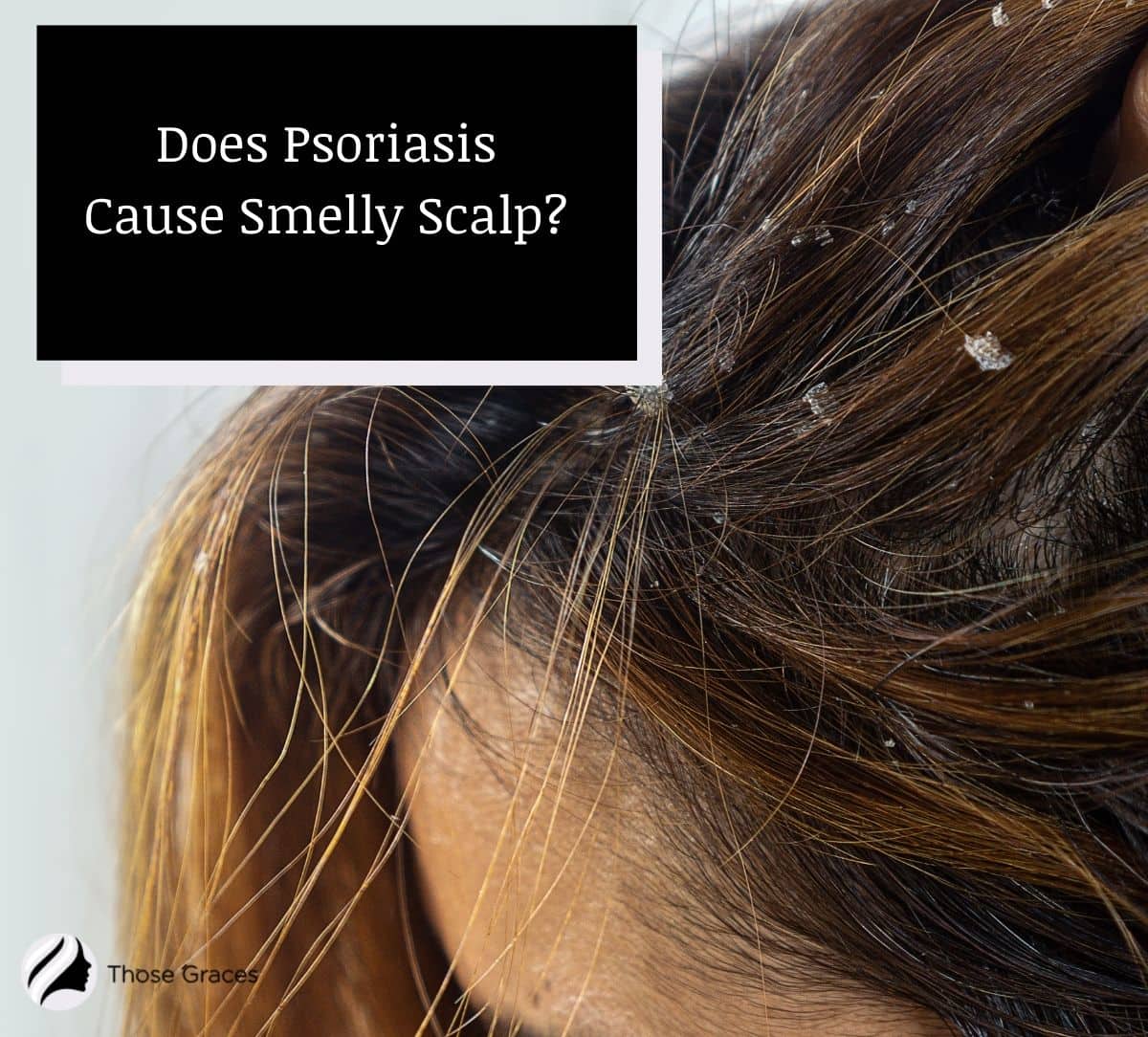‘Does scalp psoriasis smell?’ is a common question from patients who have scalp psoriasis. This question is typically followed by concerns about its nature and rate of contagion.
Data from the National Psoriasis Foundation shows that about two percent of the global population live with psoriasis.
Here I will discuss the meaning, nature, and methods of dealing with scalp psoriasis.
Table of Contents
What is Scalp Psoriasis?
Before taking you through why scalp psoriasis smells, let’s understand what it is.
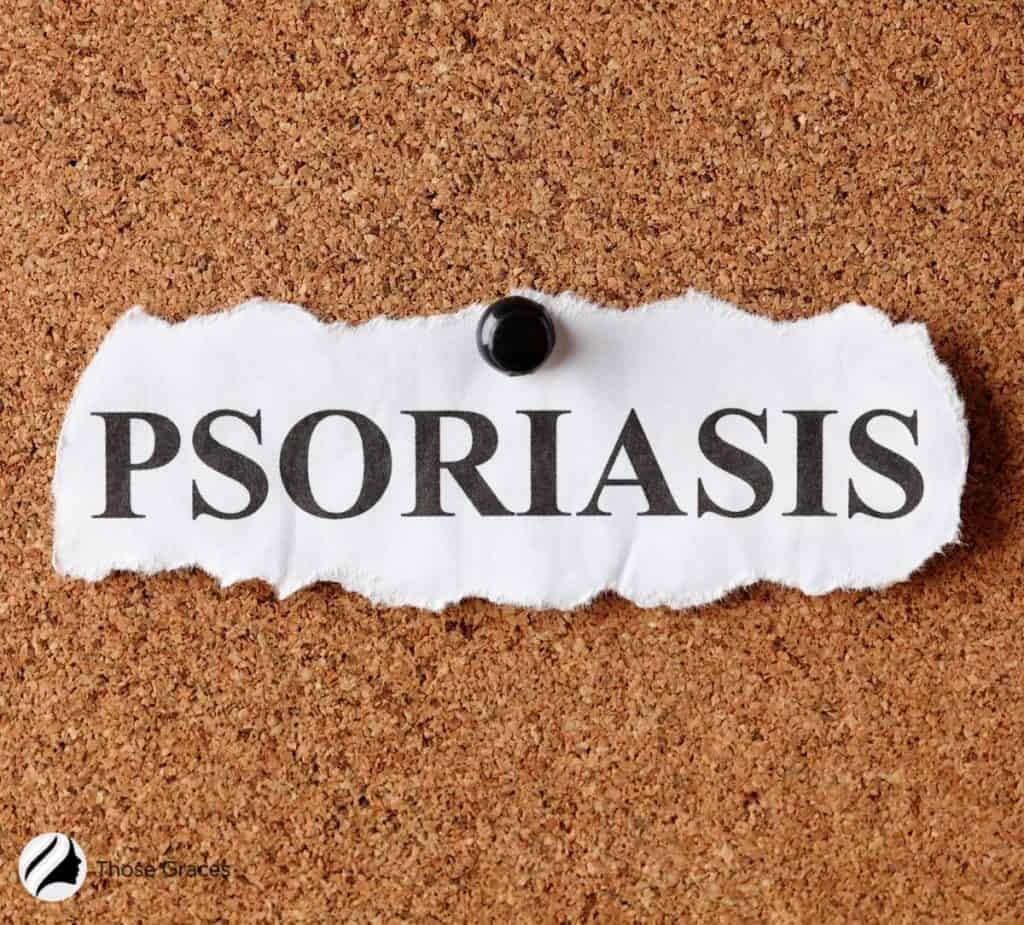
Plaque psoriasis is a skin condition caused by increased activity of the individual’s immune system. Such increased activity will result in the overproduction of the skin cells in a particular location.
Like any other autoimmune disease, it has no cure. Contrary to some views, you can’t contract psoriasis from an affected individual.
However, your chances of developing the condition increase if someone in your family has it. It is also a typical chronic condition; it develops over a while and could last throughout life.
As stated above, scalp psoriasis is one of the most common types of psoriasis (1). Half of the people with psoriasis in the US have it on their scalp, as well as some other skin surfaces.
Another common form of psoriasis is inverse psoriasis, which occurs where there are folds of skin such as the armpits and groin.
People who have scalp psoriasis have reddish, swollen patches on their scalp. The condition could manifest as a single spot or patch on the scalp, extending to the neck and the ears.
The severity varies in different people. While some might have small, barely noticeable spots, others suffer much discomfort because of the thick patches scattered on their scalp.
For instance, the itchiness could disrupt sleep and work schedules. It could also degenerate into other skin infections and hair loss.
Watch this video from Dr. Dray to learn more!
Symptoms of Psoriasis
Mild scalp psoriasis might only be expressed as slight scaling. The severe forms, on the other hand, display several tell-tale signs and symptoms, some of which include:
- Dry scalp
- Reddish patches
- Swollen, and scaly patches on the scalp
- Flaky skin
- Itching and soreness
- Hair loss
Predisposing Factors
Scalp psoriasis arises due to abnormal immune system activity. Genetics has a significant role in the manifestation of the ailment, although some other factors could predispose individuals to develop scalp psoriasis.
Such other factors include:
- Sedentary living.
- Inflammatory factors, especially those typical of obese people.
- Dietary sensitivities, like gluten intolerance and nutritional deficiencies.
The National Psoriasis Foundation also highlights external factors that could aggravate scalp psoriasis symptoms, such as:
- Stress
- Infections, like sore throat
- Frequent skin injuries
ALSO CHECK: Is Volumizing Shampoo Bad for Hair?
Treatment
There are various medical treatment regimens (2) for scalp psoriasis flares, whether mild or severe cases. While there is no cure for psoriasis, the symptoms can be kept in check.
Mild psoriasis treatments involve over-the-counter (OTC) drugs for topical treatment. You rub into your scalp after loosening the skin scales. The drugs work to soothe and moisturize the skin while relieving the itching.
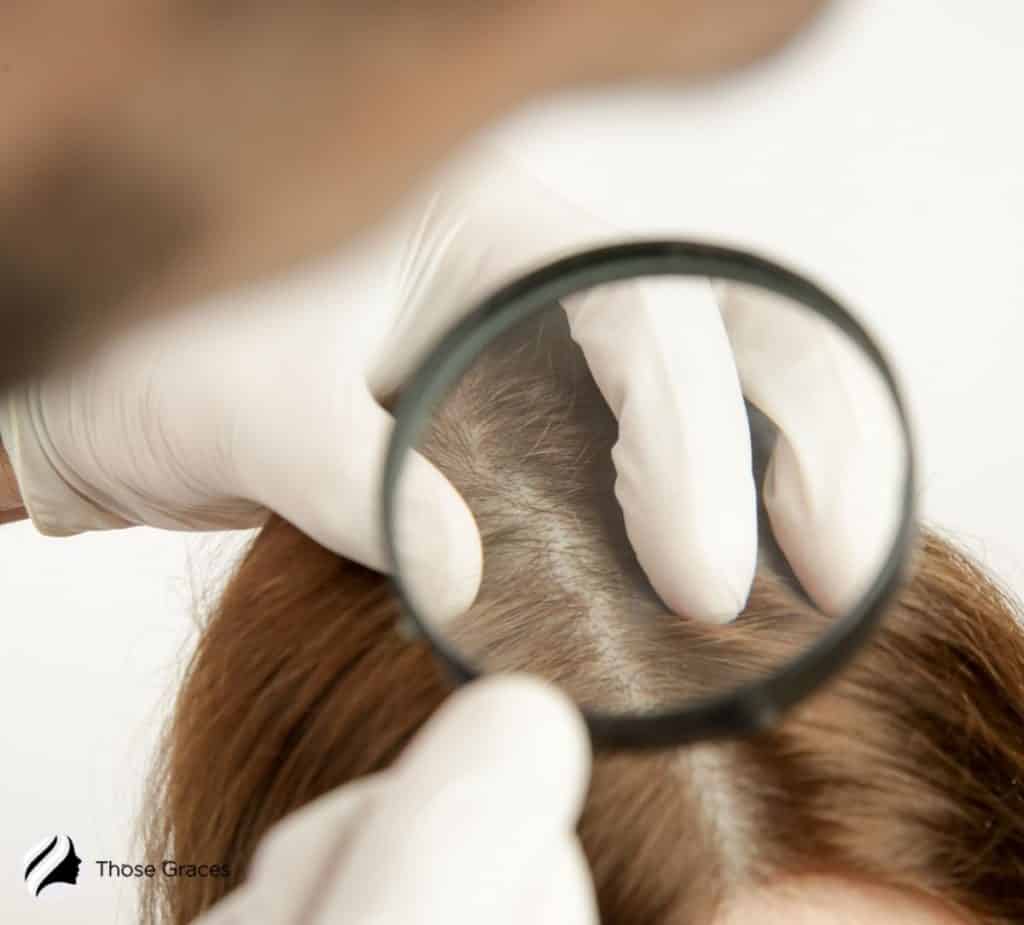
Many topical medications contain salicylic acid, Aloe Vera, coal tar, zinc pyrithione, and selenium sulfide.
These ingredients interact with the plaques, soothe the pain, and help prevent symptom flare-ups. Some prescriptions could contain steroidal injections and antihistamines to reduce inflammation and relieve the itchy skin.
However, OTC medications have an important downside. Patients could develop tolerance to the drugs after some time of usage. At this point, the drug loses its effectiveness.
For this reason, healthcare professionals will have to change their drug prescriptions from time to time.
Severe scalp psoriasis cases require stronger steroid medications, like Betamethasone Dipropionate Diprolene lotions, and anthralin, which require rinsing out from the scalp after application.
The steroids can be foams, shampoos, lotions, or sprays for topical application.
Other systemic treatment options available for severe scalp psoriasis include:
- Ultraviolet radiation treatment kills the rapidly dividing cells.
- Systemic medications are given to depress the immune reaction, like Cyclosporine, or reduce the growth of skin cells, like Methotrexate.
The systemic treatment plan is prescription-only. You can only use them when you have a doctor’s note.
Does Psoriasis Cause Smelly Scalp?
Contrary to popular opinions, people with scalp psoriasis don’t always have smelly scalps.
However, some patients notice that their hair smells musty even after washing it. The odor is probably due to a separate condition you might not be paying enough attention to.
If you observe scalp psoriasis and notice a foul odor, it is often because of some other underlying condition.
About eighty percent of psoriasis conditions comprise of scaly patches, which are less likely to ooze fluid. As a result, the plaques don’t have any particular odor themselves.
Why Does Scalp Psoriasis Smell?
Does scalp psoriasis smell bad? You might wonder why your scalp smells bad even when we said psoriasis doesn’t make it smell foul.
While psoriasis might not be directly responsible for the foul odor (3), it can create some other factors that make your scalp produce an unpleasant smell. Some of the reasons your scalp might smell when you have scalp psoriasis include:
- The cells in the scaly skin can trap bacteria in the environment through sweat from other parts of the scalp and cause foul odors. The infective agent could also be fungi, as in yeast infections, which will eventually smell bad.
- Neglect is another reason you might notice your scalp smells. If you don’t frequently remove the dry scales from your scalp and wash the scalp thoroughly, it will smell foul.
- Your medications could also emit strange odors, especially those that contain coal tar. Those smells mix with sweat and skin oils, resulting in foul smells.
RELATED: WHY DOES MY SCALP SMELL?
How to Get Rid of Scalp Psoriasis Smell
There are several remedies for smelly scalps as a result of scalp psoriasis. You often don’t have to see a doctor to treat them since you know why the scalp smells. Some of the common remedies you could use are:
1. Shampoos
You might sometimes neglect other parts of your scalp while treating scalp psoriasis. Not washing those other parts could make them excellent spots for bacterial or fungal infections or odor accumulation.
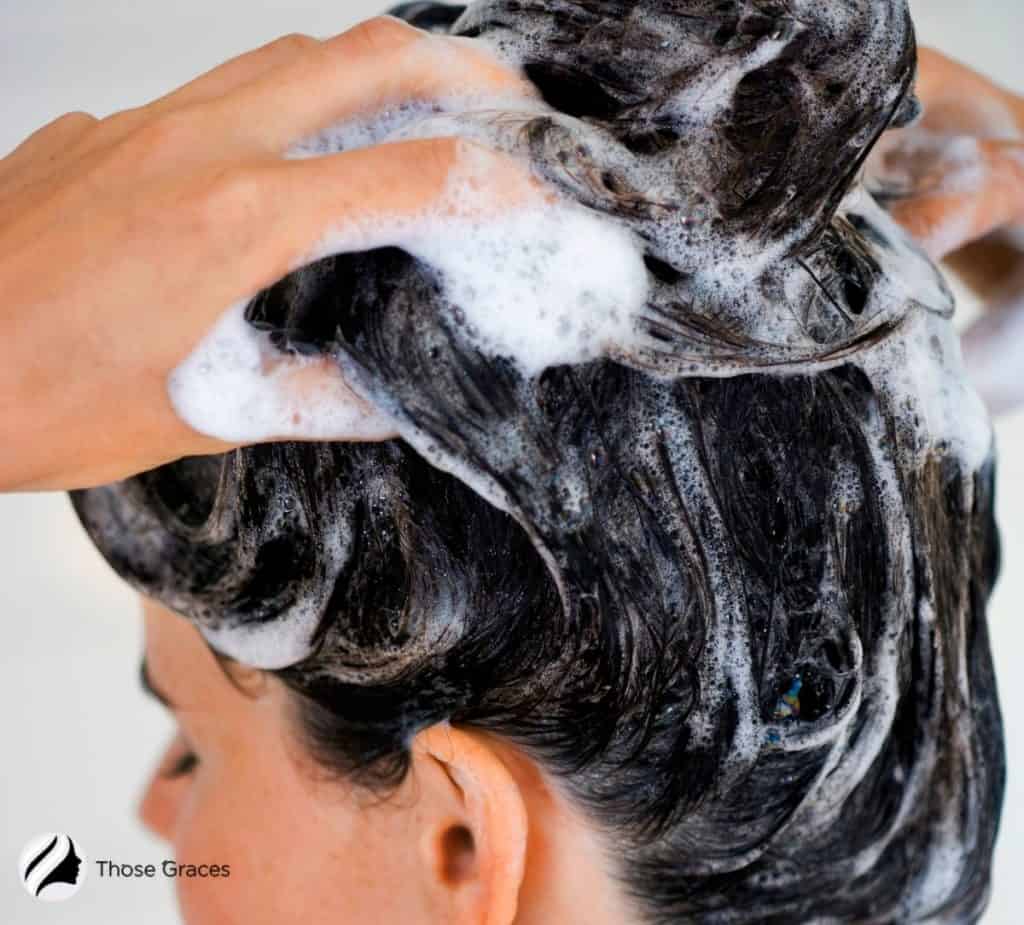
Consequently, it would help if you used certain shampoos (4) for washing your scalp after treating the psoriasis plaques.
Since some of these shampoos are also prescribed for psoriasis, it would feel like shampooing the entire scalp. The best shampoo for smelly scalps contains some of the following ingredients:
- Coal tar
- Ketoconazole
- Selenium sulfide
- Salicylic acid
- Zinc pyrithione
These ingredients have proven antimicrobial effects. So they are effective for preventing infections on your scalp, which could lead to an unpleasant smell.
Popularly recommended shampoos for removing scalp psoriasis smell include Neutrogena T/Gel Therapeutic Shampoo, Dermarest Psoriasis Medicated Shampoo, and OGX Extra Strength Refreshing Scalp.
2. Essential Oils
Essential oils, like tea tree oil and lemongrass oil, give excellent results when you use them for smelly scalps. They are also antimicrobial, helping to ensure the rest of your scalp is free from infections.

3. Aloe Vera
The essence from aloe plants is a long-time top pick for skin problems. Its anti-inflammatory and antibacterial properties help prevent smell-producing bacteria from establishing on your scalp.
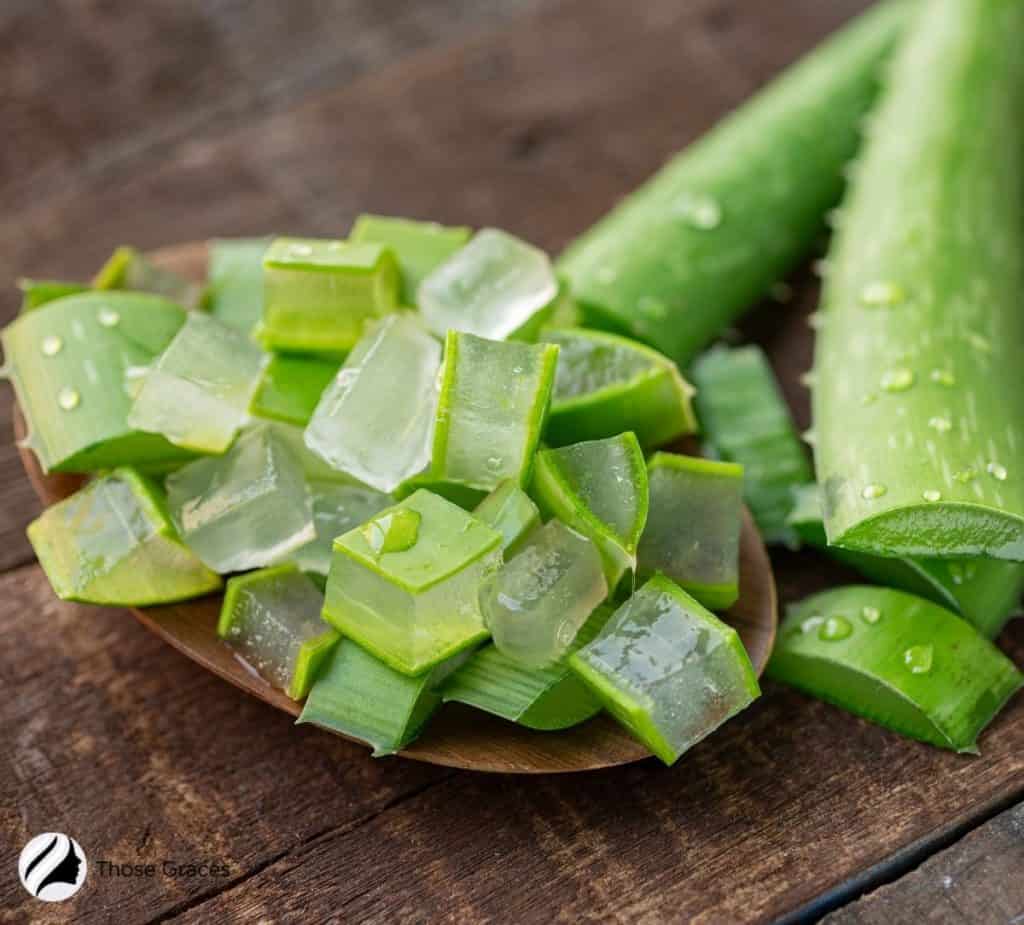
4. Lemon Juice
Lemon juice is especially effective in preventing smelly scalps. The antiseptic nature of the extract ensures that it inhibits the build-up of skin oils and dead cells and the bacterial and fungal establishment.
What To Do To Avoid Scalp Psoriasis Smell?
As stated above, scalp psoriasis doesn’t directly cause smelly scalps. The build-up of sweat, skin oils, and dead skin cells on the other parts of the scalp are the leading causes of foul smells.
The following measures would ensure your scalp stays healthy and doesn’t smell, even with psoriasis.
1. Wash Your Hair and Scalp Thoroughly
Washing your hair and scalp is essential to keeping your scalp and hair odorless.
The washing clears any build-up of oils and sweat on the scalp, making it unsuitable for microbial infection. Ensure you also scrape the skin scales, as they are common sites of infection.
2. Wash Your Scalp Adequately
Overwashing or under washing your scalp at times could also lead to foul smells. Overwashing your scalp could lead to accelerated production of sebum and other skin oils, which in turn cause smelly scalps.
Underwashing the scalp will lead to accumulated debris, which bacteria could establish.
The solution is to wash your scalp daily with the recommended shampoo to ensure it stays healthy. It is also advisable to use warm water, as hot water has the same effect on your scalp as washing too often.
Here is a video that captures effective ways to deal with smelly scalps:
FAQs
How can I prevent my scalp from smelling?
Is psoriasis bacterial?
Conclusion
Does scalp psoriasis smell? While scalp psoriasis doesn’t directly cause any impact on your scalp’s odor, it could permit other factors that cause smelly scalps.
The most effective solution is to wash your scalp correctly with the appropriate shampoos to prevent skin oil and sweat accumulation.
These provide excellent media for microbial growth. Importantly, you should seek medical advice before using any of the home remedies.
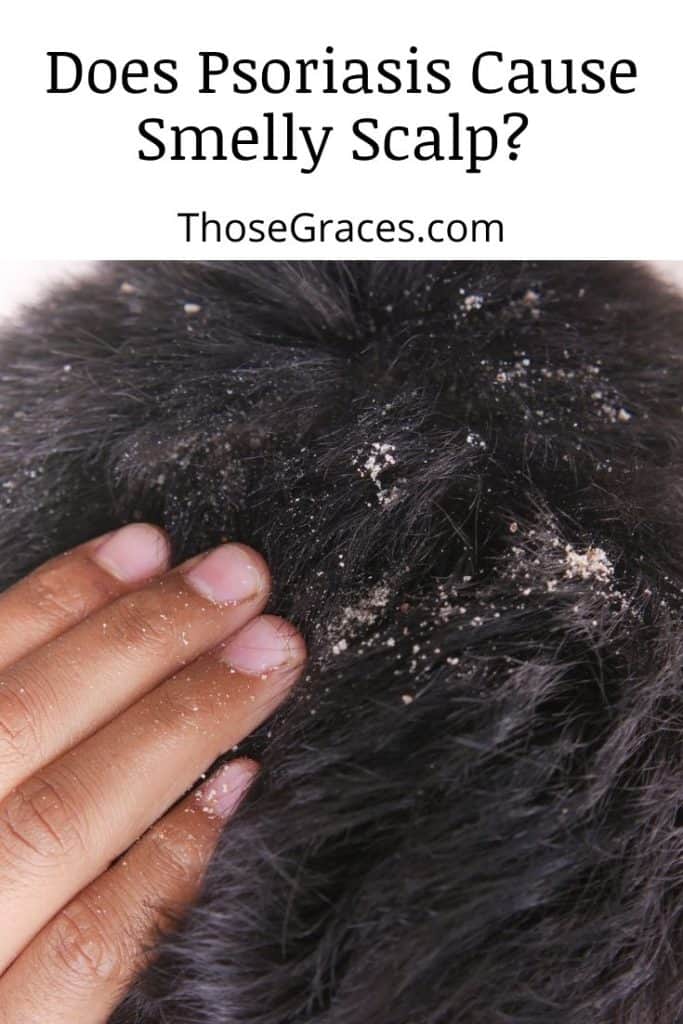
What do you think of scalp psoriasis? Let us know below!
Resources
- 1. Aldredge LM, Higham RC. Manifestations and Management of Difficult-to-Treat Psoriasis. Journal of the Dermatology Nurses’ Association [Internet]. 2018;10:189–97. Available from: https://journals.lww.com/jdnaonline/Pages/articleviewer.aspx?year=2018&issue=07000&article=00002&type=Fulltext
- 2. Gooderham M, Blakely K. Management of scalp psoriasis: current perspectives. Psoriasis: Targets and Therapy. 2016;33.
- 3. Does Psoriasis Have a Smell? [Internet]. MedicineNet. MedicineNet; 2021 [cited 2022 Jun 28]. Available from: https://www.medicinenet.com/does_psoriasis_have_a_smell/article.htm#:~:text=Scalp%20psoriasis%20may%20sometimes%20develop
- 4. Topical treatments for scalp psoriasis [Internet]. Cochrane Library. 2016 [cited 2022 Jun 28]. Available from: https://www.cochranelibrary.com/cdsr/doi/10.1002/14651858.CD009687.pub2/full
